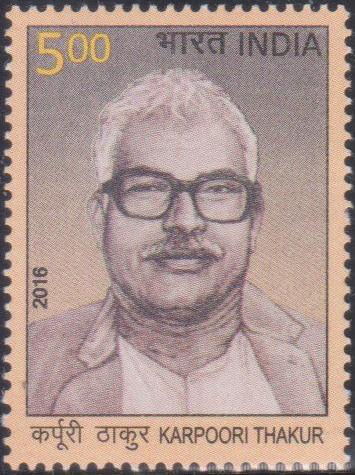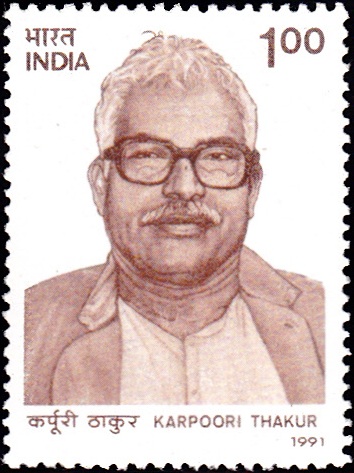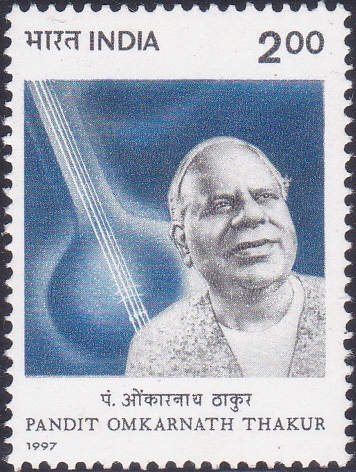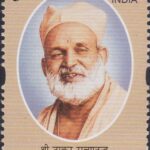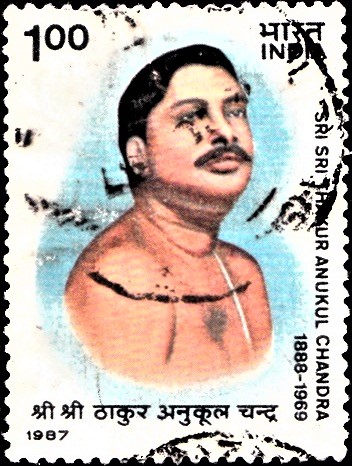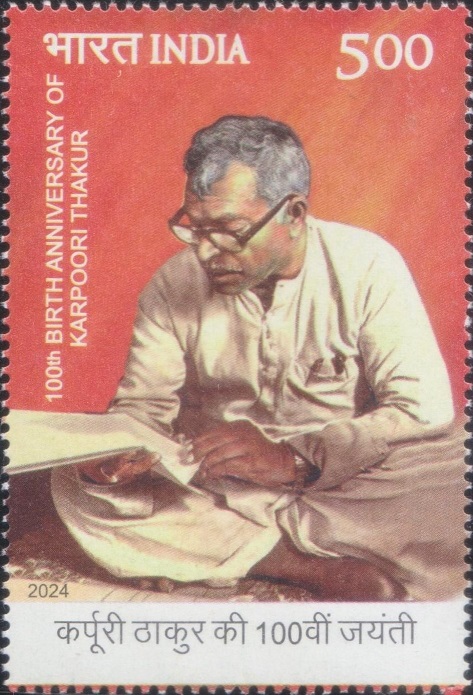
Karpoori Thakur 2024
A commemorative postage stamp on the 100th Birth Anniversary of Bharat Ratna Jan Nayak Karpuri Thakur, former Chief Minister of Bihar :
 Issued by India
Issued by India
Issued on Jan 24, 2024
Issued for : Department of Posts is proud to issue Commemorative Postage Stamp on 100th Birth Anniversary of Karpoori Thakur and salutes his endeavour to fight for the cause of downtrodden in the society.
Credits :
Stamp/FDC/Brochure : Sh. Sankha Samanta
Cancellation Cachet : Sh. Sankha Samanta
Type : Stamp, Mint Condition
Colour : Multi Colour
Denomination : 500 Paise
Stamps Printed : 201600
Printing Process : Wet Offset
Printer : Security Printing Press, Hyderabad
Name : Karpoori Thakur
Born on 24 Jan, 1924 at Pitaunjhia, Bihar and Orissa Province, British India [now in Samastipur district, Bihar, India]
Died on 17 Feb, 1988 at Patna, Bihar, India
About :
- Karpoori Thakur was born on January 24, 1924, in Pitaunjhia, a small village in Samastipur, Bihar. Hailing from a modest background, he rose to prominence through his dedication to social justice and political activism. His father was from the ‘Nai’ (barber) community in Bihar. Karpoori Thakur was the first Non-Congress CM of Bihar in 1971. He became CM Twice, 1970-1971 and 1977 and became Deputy CM in 1967. He was politically influenced by Loknayak Jaiprakash Narayan and Dr. Ram Manohar Lohia. His life and career were marked by a commitment to empower the marginalized communities, leaving an indelible impact on Bihar’s political scenario.
- Karpoori Thakur’s early life was shaped by the socio-economic conditions prevalent in Bihar during the pre-independence era. Despite facing financial constraints, he pursued his education with diligence. The formative years instilled in him a deep sense of empathy for the underprivileged, motivating him to work hard for positive change.
- His entry into active politics occurred against the backdrop of India’s struggle for independence. Thakur, inspired by the spirit of the times, became involved in various social and political movements, and he became a noted figure during the Indian freedom struggle. He was also jailed during Bharat Choro Aandolan (Quit India Movement).
- Thakur’s political journey gained momentum as he aligned himself with causes that championed the rights of the downtrodden. His entry into mainstream politics was marked by his association with socialist ideologies. Thakur’s commitment to egalitarian principles saw him emerge as a prominent leader, and people believed in him and his cause.
- One of the defining moments in Thakur’s political career came with his election to the Bihar Legislative Assembly. His advocacy for the rights of the underprivileged found popularity among with voters, propelling him to leadership roles within the socialist movement.
- Karpoori Thakur’s tenure as the Chief Minister of Bihar marked a transformative phase in the state’s history. His leadership, characterized by a resolute commitment to social justice, resulted in groundbreaking policies aimed at uplifting marginalized communities. He played a pivotal role in the implementation of reservation quotas for Other Backward Classes (OBCs) in government jobs and educational institutions.
- The introduction of reservation policies under Thakur’s administration aimed to address historical injustices and provide opportunities for those historically marginalized. These policies sought to create a more inclusive and equitable society.
- Thakur’s governance style’s primary character was defined by simplicity and accessibility, earning him the nickname “Jan Nayak” (People’s Leader). His administration prioritized grassroots development, emphasizing education, healthcare, and infrastructural improvements. Thakur’s policies were rooted in the belief that social progress was intrinsically linked to economic and educational empowerment.
- Karpoori Thakur’s untimely demise in 1988 marked the end of an era in Bihar’s political landscape. However, his legacy endures through the enduring impact of the policies he championed and the indomitable spirit of social justice he embodied. Thakur’s life serves as an inspiration for future generations, reminding them of the transformative power of principled leadership in the pursuit of a more just and inclusive society.
- Text : Referenced from content provided by Proponent.


